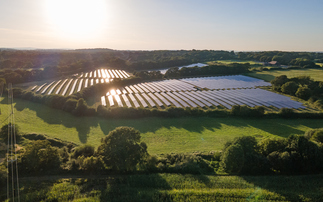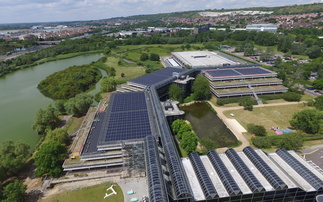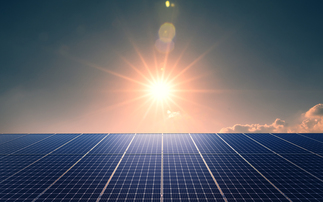Researchers call for new tax that would take account of significantly bigger carbon footprint of Chinese solar modules
As European solar panel manufacturers battle against cheap modules produced in China, researchers in the US have called for the industry to set a "carbon tariff" that would push up the cost of products that fail to meet certain environmental standards.
Scientists from Northwestern University in Illinois and the US Department of Energy's Argonne National Laboratory unveiled a study late last week which found solar panels produced in China have a carbon footprint that is almost twice the size of those produced in Europe.
The reason, says Argonne scientist and co-author Seth Darling, is China's laxer environmental and efficiency standards for factories and power plants as well as its prolific use of coal compared with the EU.
The researchers predicted Chinese solar panels imported to Europe would have even higher embedded emissions when transporting a solar panel to its final destination was added to the equation, although they did not include this element in their analysis.
The carbon footprint of different types of solar panels as made in China (CN) or Europe (RER) (click to enlarge)
"It takes a lot of energy to extract and process solar-grade silicon, and in China, that energy tends to come from dirtier and less efficient energy sources than it does in Europe," said Darling.
However, he added that the gap was likely to close over the coming years as China is implementing stricter environmental regulations. The government is putting in place a wide range of measures to fight a war on smog, just last week revealing that it will increase funding to regions that successfully tackle air pollution while also penalising laggards.
But until those regulations start to take effect, the researchers suggested placing a "carbon tariff" of €105 (£85) to €129 per tonne of CO2 on solar panels to recognise how modules from some countries can have a significantly higher environmental impact than others.
The tariff would be calculated based on the carbon footprint and energy efficiency difference between manufacturing regions, the report proposed. Dajun Yue, a lead author on the paper from Northwestern, predicted that a carbon tariff would be much more effective for levelling the playing field than the anti-dumping tariffs placed on Chinese solar panel manufacturers by the EU last year. Although the two regions reached an "amicable solution" to the long-running trade dispute, European-based solar manufacturers were left angry at the failure to deliver a higher minimum price for imported solar panels.
"The break-even carbon tariff we calculated, which is at the range of €105 to €129 per tonne of carbon dioxide, depending on the possible carbon tax to be imposed by these two regions in the near term, is close to the reported CO2 capture and sequestration cost," Yue added.
The study looked at the impacts of three types of silicon solar modules, which represent about 90 per cent of the solar panels made in the world today. It found that a solar panel made in China would take about 20 to 30 per cent longer to produce enough energy to cancel out the energy used to make it.
Significantly, single crystal solar panels took the longest to deliver "pay back" despite being the most efficient at harvesting energy. Conversely, ribbon silicone solar panels achieve the quickest payback but are the least efficient. Multicrystalline panels, which provide mid-range efficiency, also had a mid-range payback time.
How the proposal will be met by the EU or China remains to be seen and it is unlikely that it could be enacted with out reigniting the trade spat between the two blocs. However, the research once again serves to highlight how so-called embedded carbon can undermine the green credentials of even the most environmentally friendly products.









